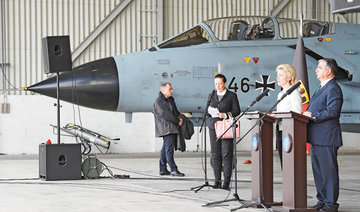ANKARA: Turkey may re-evaluate the status of the Incirlik Air Base and Kurecik Radar Station if the US imposes sanctions, said Turkish Foreign Minister Mevlut Cavusoglu in an interview to pro-government channel A-Haber.
This bombshell statement has come on Wednesday amid widespread claims that the US’ long-awaited Countering America’s Adversaries Through Sanctions Act (CAATSA) may be on their way toward Turkey before the end of the year.
Ozgur Unluhisarcikli, Ankara office director of the German Marshall Fund of the US, said one of the core principles of Turkish foreign policy is reciprocity and Turkey will definitely seek ways to retaliate if the US imposes the CAATSA sanctions.
The Incirlik issue has long been a focal point between the nations. It is regularly used as a bargaining chip at times of tension because the air base symbolizes Turkey’s anchorage to the West.
But despite all the previous threats over Incirlik’s use, it has always remained open, even at times of heightened tension.
“Turkey is not the place to host US nuclear arms,” Steven Pifer, from the American Brookings Institution research group, recently wrote in a report following US President Donald Trump’s public confirmation of the weapons’ presence on Turkish soil.
The critical military air base, which is located in the southern province of Adana close to the Syrian border, was used regularly for anti-Daesh airstrikes in Syria and Iraq.
Two years ago, Ankara allegedly warned US officials that it could close its airspace to American jets and deny the US’ decades-long access to Incirlik if the Syrian Kurdish YPG participated in the Raqqa operation against Daesh.
In June, Turkish President Recep Tayyip Erdogan reportedly played the Incirlik card as a leverage in his meeting with Trump on the sidelines of the G20 summit in Osaka, Japan.
However, for Unluhisarcikli, Incirlik is currently one of the few cards Turkey is holding and perhaps the only consequential one.
“The US has alternatives to Incirlik, but they are more costly and less efficient,” he told Arab News.
Section 13 of the Countering Turkish Aggression Act of 2019, a bill which was introduced on Oct. 16, requires “the president within 30 days of enactment to submit an interagency report assessing viable alternative military installations or other locations to host US forces personnel or assets currently stationed at Incirlik Air Base in Turkey.”
The bill, which was sponsored by Republican Senator Lindsey Graham, has not been enacted.
In the meantime, Italy has begun withdrawing its SAMP/T anti-missile battery and 130 soldiers it has deployed in Turkey’s southeastern province of Kahramanmaras for 30 months as part of a NATO operation.
Unluhisarcikli said that closing down the Kurecik Radar Station, a key NATO base in the eastern Malatya province, may not be an appropriate response as it serves NATO’s missile defense system, not the US’.
“If Turkey shuts down Kurecik, it will face a strong reaction from European allies who have nothing to do with the sanctions the US will likely impose on Turkey,” he said.
Ankara is considering Russian warplanes as an alternative to the US-made F-35 jets if Washington does not deliver them over the concern that the operation of the S-400s missile systems could expose some of the jet’s classified features to Russian intelligence gathering.
Turkey and Britain have also agreed to accelerate their joint project on building fighter jets.
Joe Macaron, a fellow at the Arab Center in Washington, said the immediate repercussions of closing Incirlik and Kurecik is moving beyond rhetoric and taking tangible steps to disentangle the core of the strategic partnership between Washington and Ankara.
“The US priority should be having contingency plans to secure withdrawing the US nuclear weapons storage in the Incirlik air base, if such a plan is not executed yet,” he told Arab News.
As a back-up plan, the US recently invested heavily in the Jordanian Muwaffaq Salti Airbase, although experts underline that no single base can substitute the strategic location of Incirlik.
“The operation to kill Daesh leader Abu Bakr Al-Baghdadi took off from Iraq and there have been Turkish restrictions on US operations in Syria launching from Incirlik base,” Macaron said.
But, for Macaron, it is unlikely that Ankara will close the Incirlik base for US operations.
“The Turkish government is once again exploiting the divide between the White House and Congress over US sanctions on Turkey, hence hoping that Trump would veto the congressional bill on Turkey. If Ankara gives Incirlik to Moscow, which is not anticipated in the foreseeable future, Turkey will have gone too far in its alliance with Russia and that will have far-reaching implications on regional and global politics,” he said.



























